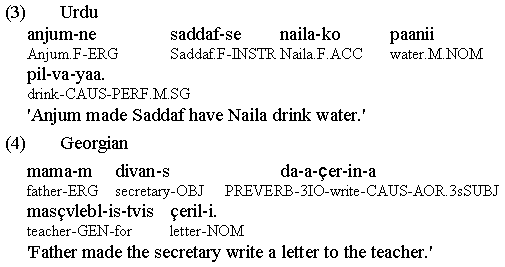
Freitag, 12.30 Uhr
When complex predicates are built, the arguments of the individual verbs or affixes involved are united into one argument structure. The combination of ditransitive base verbs (either simplex or derived verbs) with a causative verb or affix may thus lead to an argument structure containing four arguments. In languages with three different structural linkers, the question is which of the four arguments of the complex verb is excluded from structural linking. The choice of the excluded argument varies across languages: In Turkish, for instance, the causee, i.e. the subject of the base verb, is realised as a postpositional phrase. In contrast, in Basque the indirect object of the base verb is realised as an oblique phrase, while the causee is linked with structural dative, compare (1) versus (2).

This difference between Turkish and Basque is systematic and conditioned by the general linking system of the language: accusative languages (like Turkish) exclude the causee from structural linking, while ergative languages (like Basque) exclude the middle argument of the base verb from structural linking. Given this generalization, it is striking to see that languages with split linking systems may follow either of the patterns, but they never seem to mix the patterns. Urdu, for instance, follows the Turkish type, see (3), while Georgian follows the Basque type, see (4).

To account for the differences in the linking of 4-place verbs, I will follow a theory of argument linking first proposed by Kiparsky. In this theory, the structural case or agreement affix of an argument is determined by combinations of two features that indicate the relative position of the argument in the argument structure of the (complex) verb. Which argument of a 4-place verb is excluded from structural linking depends on which feature is more basic in the general linking system of the language.
zum Programm der AG 7
zur alphabetischen Übersicht der Abstracts
zur zeitlichen Übersicht